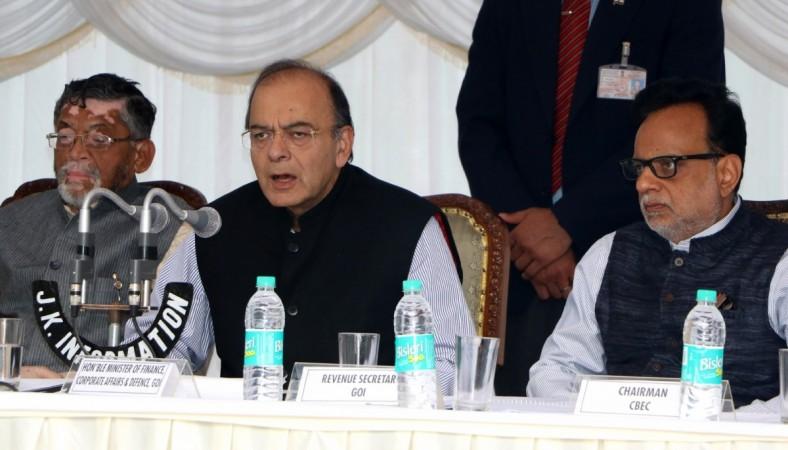
Moving to placate key sectors of the industry which have raised concerns about the high rates of taxes under the Goods and Services Tax (GST) regime eating into their operational viability, the GST Council on Sunday announced that it is revising the GST rate on 66 categories of goods and services.
Addressing a press conference after the 16th GST Council meeting, Finance Minister Arun Jaitley said that the reductions were based on the two major principles of maintaining equivalence and the change in utilisation behavior.
The Council's move is expected to come as a relief to small and medium enterprises in trading and manufacturing as well as restaurants. Under the revised tax rate scheme, packaged food like vegetables, pickles and sauces, as well as dental wax, insulin, agarbattis, school bags, exercise and colouring books for children, cutlery and computer printers will be cheaper by 6-10 per cent (see chart).
The new tax rates proposed for goods and services under the GST rollout planned for July 1 are expected to come bundled with a range of cesses on luxury and premium goods as well as on tobacco and high-end liquors.
The Finance Ministry tweeted on Sunday that it had received representations for about 133 items, out of which rates have been reduced on 66 items.
Cinema gets a breather
Besides, reductions will be carried out on two categories of GST rates which were planned to be imposed on cinema-goers – 28 per cent tax will be levied on tickets priced at above Rs 100 and 18 percent on tickets costing up to Rs 100.
This notwithstanding, single-screen cinemas are likely to be hit the hardest by the proposed 28 percent tax rate.
Jaitley later said on the Twitter handle of the Union Ministry of Finance that the new concessions would come at the cost of revenues. "FM @arunjaitley said that rates on goods decided today would make the goods cheaper for common man but may cost to revenue of Govt," the finance ministry tweeted.
For workers in industries like textiles and diamond processing where the workers take their work home, tax rate will be revised to 5 percent from the 18 percent currently being charged. This is owing to GST for these sectors being revised as well.
Till date, the GST Council has fixed rates of more than 1,200 goods and 500 services. Last Saturday, it finalised rates for a few contentious goods such as gold and jewellery, agricultural implements, biscuits, footwear and textiles.
A few of the items on which tax rates were revised at Sunday's GST Council meeting:
| Items | Old rate | New or revised rate |
| Packaged goods (vegetables, pickles, sauces) |
18% | 12% |
| Cashew | 12% | 5% |
| Agarbatti | 12% | 5% |
| Dental wax | 28% | 8% |
| Insulin | 12% | 5% |
| Plastic beads | 28% | 18% |
| Plastic tarpaulin | 28% | 18% |
| School bags | 28% | 18% |
| Exercise books | 28% | 12% |
| Colouring books | 12% | Nil |
| Pre-cast concrete pipes | 28% | 18% |
| Cutlery | 18% | 12% |
| Tractor components | 28% | 18% |
| Computer printers | 28% | 18% |
The GST tax structure for various services has been devised under four broad slabs -- 5, 12, 18 and 28 percent -- along with a cess on luxury and demerit goods such as tobacco, pan masala and aerated drinks.
The GST plan envisages that the Centre compensate the states for revenue losses from abolition of taxes like the VAT (value added tax), octroi and implementation of GST. The compensation from the Centre to the states will be met through levy of a 'GST Compensation Cess' on luxury items and goods like tobacco, during the first five years of implementation of the GST regime.
Filing limits raised
Jaitley said that the limit under the GST Composition Scheme has been raised to Rs 75 lakh. Taxpayers coming under this scheme will be required to file summarized returns on a quarterly basis, instead of three monthly returns. Under the scheme, a registered taxpayer will pay tax at a rate not more than 1 percent for manufacturers, 2.5 percent for restaurants and 0.5 percent for other traders.
The GST Composition Scheme was introduced under GST law to lower the burden of compliance for small businesses, where assessees have to pay tax at a minimum rate based on their turnover. This is similar to the provisions in VAT law. Any assessee who deals only in supply of goods can opt for this scheme, which means this provision is not applicable for service providers. However, restaurant service providers are excluded.
Only businesses participating in intra-state supply of goods are eligible to enter the GST Composition Scheme.
Most services, except those in the negative list of essential services such as healthcare and education, are expected to come under GST.

















